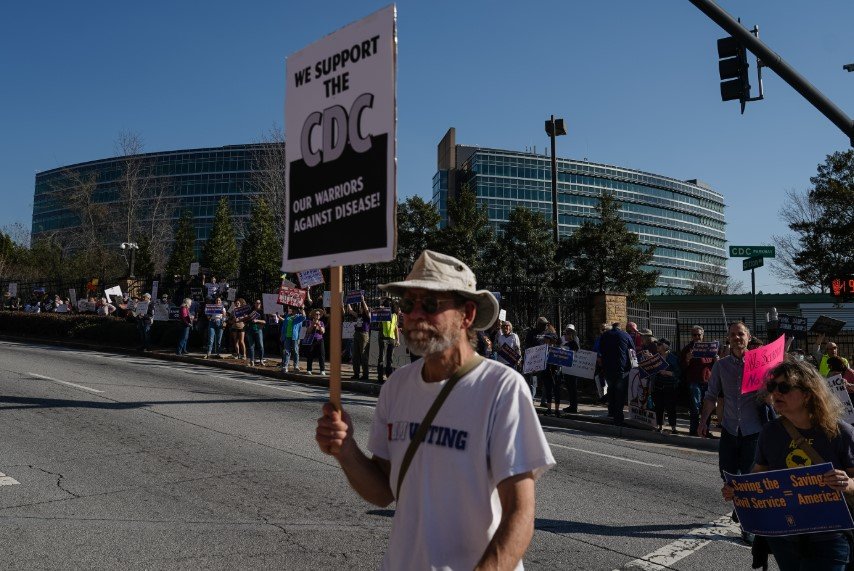The Centers for Disease Control and Prevention (CDC) is facing massive staff layoffs and budget reductions, with the agency’s HIV prevention programs among the hardest hit. Public health experts are warning that the cuts will have severe consequences, particularly in Georgia, a state already struggling with high rates of new HIV infections.
Public Health in Crisis: Georgia at the Epicenter
The CDC, headquartered in Atlanta, has played a crucial role in the fight against HIV for decades. The latest budget reductions announced by the Trump administration will not only cost jobs but also disrupt key programs aimed at preventing new infections and improving treatment outcomes.
- Georgia has one of the highest HIV infection rates in the U.S., with only Miami and Memphis recording more new cases annually.
- In 2022 alone, 2,575 new HIV diagnoses were reported in the state.
- Over 60,000 Georgians are currently living with HIV, and nationwide, approximately 1.2 million Americans are affected by the virus.
Sara Ziegler, a former associate director at the CDC, didn’t hold back in her assessment of the crisis. “We are going to see people die of AIDS in the U.S. in 2025. That wasn’t happening anymore, but it will again.”

The Programs Being Cut: What’s at Stake?
The layoffs have significantly impacted five crucial CDC divisions that focus on HIV prevention:
- Behavioral and Clinical Surveillance: Collects data on how HIV affects different populations and assesses treatment effectiveness.
- HIV Prevention Capacity Development: Supports states in building their HIV prevention programs.
- HIV Prevention Communications: Runs national awareness campaigns and maintains crucial public health websites.
- HIV Research: Studies new prevention strategies, including PrEP access and home testing.
- Quantitative Sciences: Develops models to track the effectiveness of prevention efforts and public health spending.
The loss of these programs means fewer studies on prevention, reduced public awareness campaigns, and weakened support for high-risk populations.
Economic and Human Toll: Georgia’s Public Health at Risk
The financial impact of these cuts extends beyond public health concerns. Hundreds of CDC employees in Atlanta are losing their jobs, many of them specialists in HIV prevention.
Dr. John Brooks, former chief medical officer for the CDC’s Division of HIV/AIDS Prevention, emphasized the economic ripple effects: “You have a large number of Georgia citizens who are now unemployed. Their work won’t be able to be replaced. We won’t know which programs are working or what will need to be changed.”
Additionally, Georgia’s Public Health Associate Program, which places CDC fellows in local health departments to combat HIV, is also being eliminated. That leaves counties like Cobb, Gwinnett, Macon, and DeKalb without critical prevention workers.
Impact on High-Risk Communities and Prevention Efforts
The fallout from these cuts will be especially severe for vulnerable communities already disproportionately affected by HIV. The state’s northwest region, for instance, has high rates of opioid use, which increases the risk of HIV transmission through needle sharing.
PrEP, a highly effective HIV prevention drug, costs about $30 per month without insurance and is free with coverage. However, access to it requires outreach and education—efforts that the CDC cuts will dismantle.
“If everyone who needed PrEP could access it,” said an HIV activist, “new infections in Atlanta could drop by over 90%. That would save Georgia taxpayers tens of millions of dollars in future healthcare costs.”
The Bigger Picture: What Comes Next?
The U.S. had been making strides in HIV prevention, with deaths from AIDS becoming increasingly rare. These cuts, however, threaten to reverse decades of progress. With fewer resources for research, prevention, and treatment, experts fear a resurgence of the disease, particularly in states like Georgia where the burden is already high.
As staff continue to receive termination notices and prevention programs grind to a halt, advocates warn that the consequences will be both immediate and long-term. Without intervention, the human cost of these cuts could be devastating.
